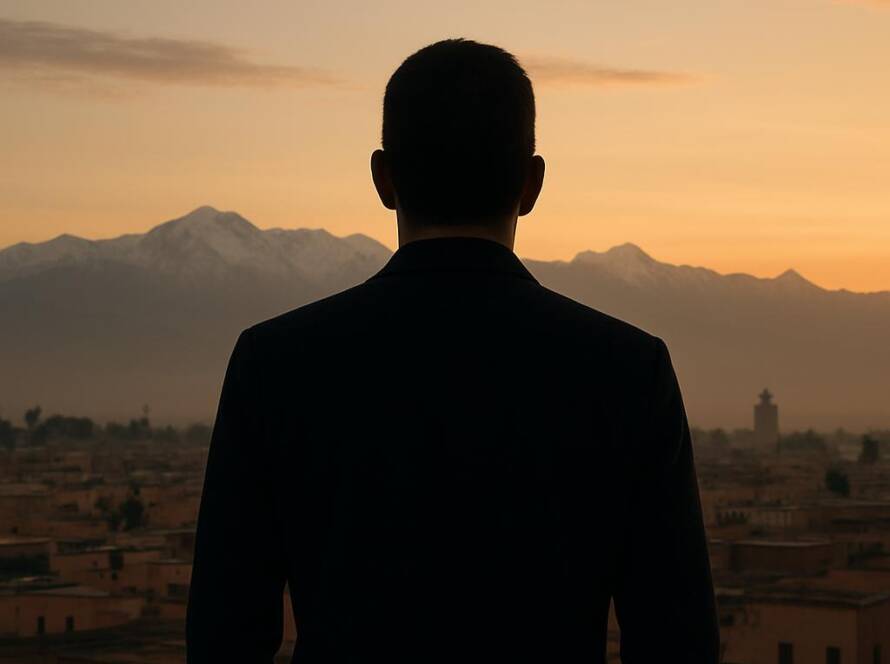You may have noticed it by now: I’ve always had a soft spot for metaphors.
Tonight, Morocco’s 2–0 win over a disoriented Tanzanian side at the Stade d’Honneur in Oujda leaves me only half-satisfied. Yes, the result is there. But beyond the stats and the scoreboard lingers a strange sensation of an incomplete success—one stripped of that collective magic that transforms a simple win into a shared celebration.
If I can’t fully rejoice, perhaps it’s because, deep down, I hold within me the idea of a more perfect victory. Where does it come from, if not from a collective memory, from a country shaped by so many victorious imaginaries? Descartes would argue that if I carry within me the idea of a perfection I’ve never actually seen, then it cannot come from experience or chance. It must have been placed there—somewhere between memory and hope—as a lasting trace of what we might one day accomplish together.
This bittersweet taste echoes other, less athletic but equally telling, scenes from my entrepreneurial daily life. I’m thinking in particular of Gitex Africa, whose third edition is fast approaching here in Marrakech. A major event for African innovation, held on our soil—yet strangely, we appear more as guests than as true hosts. Organized by a foreign entity—one we value, to be clear—this event casts us in a curious role: spectators in our own stadium.
Imagine, for a moment, the final rounds of a World Cup taking place in Casablanca, Rabat, or Marrakech… without Morocco on the field.
What if this third edition were finally the moment to reclaim meaning in our efforts? What if the victory of hosting such a grand event could evolve into something deeper, something more enduring?
This paradox calls up a powerful image: Sisypheus, the tragic figure from Albert Camus’ The Myth of Sisyphus, condemned to push a boulder up a mountain forever, only to see it roll back down again. Camus reminds us that the true tragedy lies not in the effort itself, but in the absence of meaning we assign to it. Instead of accepting isolated, repetitive efforts, why not view our work like a well-structured match—where clean passes link together, and each player channels their talent toward a common goal?
Should we continue to carry our ambitions alone? Wouldn’t it be wiser to avoid the pitfalls of the past, and rediscover the joy of collective effort? Could we turn our recurring challenges into a shared rhythm? Are we ready to sketch a clear and harmonious strategy, transforming our ascent into a solid path toward earned success?
These questions around meaning take me back to 2019, when I had the opportunity—at the request of the National Tourism Confederation—to lead a strategic and digital diagnostic from within the Emerging Business Factory. Together, we dreamed of a different kind of elevation. I had imagined calling it Morocco Next—an event designed by Moroccans, for Moroccans, and gradually opened up to the world. Inspired by the dynamic model of Slush in Helsinki, we wanted to build a gathering deeply rooted in our own identity.
Slush was launched in 2008 by a small group of entrepreneurs—Helene Auramo, Ville Vesterinen, Kai Lemmetty, Peter Vesterbacka, and Timo Airisto. What started as a modest meetup of a few hundred people became, in just a few years, one of Europe’s flagship tech events, drawing over 10,000 global visitors. Its remarkable growth wasn’t the product of a top-down plan, but the result of sincere community commitment, a collaborative spirit, and strong local grounding. When I attended Slush just before the pandemic, I felt the contagious energy of a community fully owning its entrepreneurial destiny. I hoped we, too, could someday experience that same collective force.
That’s precisely the spirit we aspire to cultivate here. Our shared hope is to move gradually toward what I dare to call a Startup State—where government itself embraces entrepreneurial values at every level: administrative, educational, economic, and social. A State where people are encouraged to take risks, learn from failures, and celebrate shared success through a unifying national project.
And if startups often learn more from failure than from success, perhaps it’s because victories tend to blur our judgment. In those moments, we risk missing the deeper lessons—the ones our victories could teach us if we stayed lucid.
But while this vision takes shape, why not seize this third edition of Gitex Africa as a testing ground? Let’s adopt the startup “lean” spirit: start small, iterate fast, learn together, and build a stronger foundation for future achievements.
Our Noyau Dur of entrepreneurial support—that tightly knit alliance of institutions, experts, incubators, public actors, and committed players—will be put to the test. It is this collective mechanism, launched through the COPERE initiative in the host region of Marrakech-Safi, that gives depth to our promise of support. In this momentum, Sisyphus—the startup, the incubator, the institution, the accelerator—will no longer be alone in pushing the boulder. We’ll help carry it, chart alternative paths, build ramps—and perhaps even aqueducts. With effort, a bit of luck, and true coordination, we just might dispel the absurdity from his ascent.
And if we manage to combine our individual talents with sincerity and intelligence, we won’t just succeed in hosting an event. We’ll open a new chapter. We’ll play a beautiful match—with style and intention.
Because in the end, the most beautiful victory isn’t in the final score—it’s in our ability to inspire, to unite, and to leave in the heart of a nation the living breath of progress: truly collective and joyfully shared.
So trust me. Get into position. I’ll make the pass.


